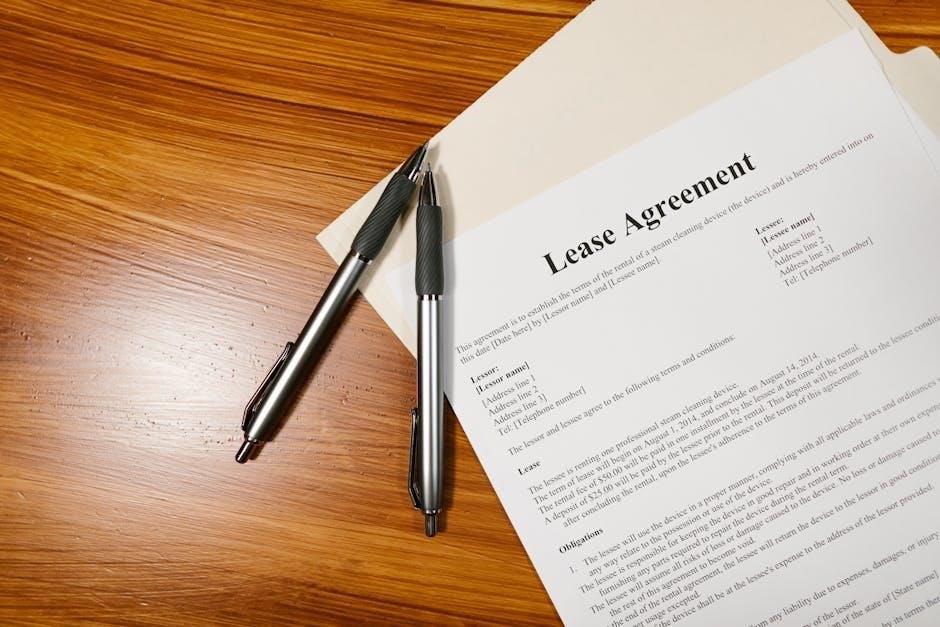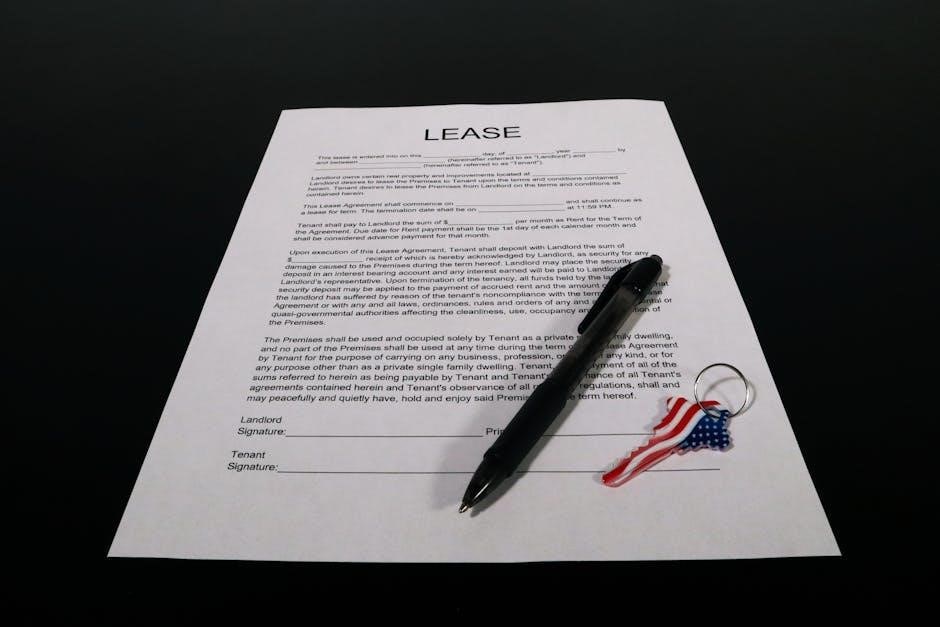
A trailer lease agreement is a legally binding contract between a lessor and lessee, outlining lease duration, payment terms, trailer usage, and responsibilities. It ensures clarity and protects both parties’ interests, providing a structured framework for renting trailers. This document is essential for establishing a clear understanding of the lease terms and conditions, ensuring legal compliance and minimizing disputes.
1.1 What is a Trailer Lease Agreement?
A trailer lease agreement is a legally binding contract between a lessor (owner) and lessee (renter) that outlines the terms and conditions for leasing a trailer. It specifies the lease duration, payment terms, trailer usage, and responsibilities of both parties. This document ensures clarity and protection for both the lessor and lessee, providing a structured framework for the rental process and minimizing potential disputes.
1.2 Importance of a Trailer Lease Agreement
A trailer lease agreement is crucial for establishing clear expectations and protecting both parties legally. It ensures the lessor receives timely payments and the trailer is returned in good condition, while the lessee has legal use of the trailer. This document minimizes disputes by outlining responsibilities, payment terms, and usage guidelines, providing a secure and transparent rental process for all involved.
Key Elements of a Trailer Lease Agreement
A trailer lease agreement includes details about the parties involved, lease duration, payment terms, trailer description, and responsibilities of both lessor and lessee, ensuring clarity and legal protection.
2.1 Parties Involved
The trailer lease agreement identifies the lessor (owner) and lessee (renter), detailing their roles and obligations. Both parties must provide accurate contact information and legal names to ensure enforceability. This section establishes accountability and ensures both sides are aware of their responsibilities, fostering a transparent and legally binding relationship throughout the lease term.
2.2 Lease Term and Duration
The lease term specifies the start and end dates of the agreement, along with any renewal or termination clauses. This section ensures clarity on the duration, preventing disputes over the lease period. It outlines the total time the lessee can use the trailer, providing a clear timeline for both parties to adhere to, ensuring compliance with the agreed-upon schedule.
2.3 Payment Terms and Conditions
This section outlines the financial obligations, including the rental amount, due dates, and acceptable payment methods. It specifies any late fees or penalties for missed payments, ensuring transparency in the monetary aspect of the lease. The terms are structured to protect both parties, providing a clear understanding of the payment schedule and consequences of non-compliance or delayed payments.
2.4 Trailer Description and Condition
This section provides a detailed description of the trailer, including its make, model, year, and VIN, as well as its current condition. It outlines any existing damage or wear, ensuring both parties have a clear understanding of the trailer’s state at the start of the lease. This protects both the lessor and lessee by documenting the trailer’s condition, preventing disputes over its return state.
2.5 Responsibilities of Lessor and Lessee
The lessor is responsible for providing the trailer in good condition and ensuring compliance with safety standards. The lessee must use the trailer as agreed, maintain it properly, and return it in the same condition. Both parties are expected to fulfill their obligations as outlined in the lease agreement, ensuring mutual accountability and a smooth rental experience. This clarity helps prevent misunderstandings and potential conflicts.
Benefits of Using a Trailer Lease Agreement PDF
A Trailer Lease Agreement PDF offers convenience, customization, and legal compliance, ensuring accessibility and professionalism for both parties, streamlining the leasing process effectively always.
3.1 Convenience and Accessibility
A Trailer Lease Agreement PDF provides unmatched convenience, allowing easy access and distribution electronically. It ensures all terms are standardized, reducing drafting time and legal complexities. The format is simple to share, store, and print, making it ideal for both parties. Its accessibility fosters transparency and efficiency, ensuring a smooth and professional leasing process from start to finish, every time.
3.2 Customization Options
A trailer lease agreement PDF offers extensive customization options, allowing users to tailor the document to specific needs. This flexibility ensures that all unique terms, conditions, and clauses can be incorporated seamlessly. Whether it’s adjusting payment terms, lease duration, or trailer specifications, the PDF format provides an adaptable solution that meets individual requirements, ensuring the agreement is both comprehensive and personalized for each transaction.
3.3 Professional and Legal Compliance
Using a trailer lease agreement PDF ensures professional and legal compliance, safeguarding both parties’ interests. The document adheres to local laws and regulations, providing a clear outline of responsibilities and expectations. This compliance helps prevent legal disputes and ensures the agreement is enforceable, offering peace of mind for both lessors and lessees by maintaining a professional and legally sound framework for the lease.

Trailer Lease vs. Rental Agreement
A trailer lease agreement differs from a rental agreement in terms of duration, payment structures, and liabilities. Leases are typically long-term, offering stability, while rentals are short-term. Understanding these distinctions helps parties choose the right agreement type for their needs, ensuring clarity in obligations and expectations for both lessors and lessees.
4.1 Key Differences
A trailer lease agreement typically involves longer terms with fixed payments, offering stability for both parties. In contrast, rental agreements are shorter-term with flexible payment options. Leases often include specific use restrictions and return conditions, while rentals provide more flexibility but may require deposits. Understanding these differences helps determine which agreement suits business or personal needs, ensuring clarity in obligations and expectations for trailers. Proper documentation is essential for both types.
4.2 When to Use a Lease vs. Rental Agreement
A trailer lease agreement is ideal for long-term use, providing stability for both parties with fixed payments. Rental agreements are better for short-term or temporary needs, offering flexibility. Choose a lease for commercial purposes or extended periods, and a rental for personal or seasonal use. Understanding the duration and purpose helps select the right agreement type, ensuring clarity in obligations and expectations for both lessors and lessees.

How to Create a Trailer Lease Agreement
Create a trailer lease agreement by obtaining a template, adding lease terms, payment details, and responsibilities. Customize to fit specific needs, ensuring legal compliance and clarity for both parties.
5.1 Gathering Necessary Information
Gather essential details, including lessee and lessor information, trailer description, lease term, payment terms, and responsibilities. Use a trailer lease agreement PDF template to streamline the process. Ensure all information is accurate and comprehensive to avoid disputes. Include vehicle identification numbers, rental periods, and specific conditions for the trailer’s use and return. This step ensures clarity and protects both parties’ interests effectively.
5.2 Outlining the Agreement Structure
Organize the trailer lease agreement PDF into clear sections: lease terms, payment details, responsibilities, and signatures. Start with an introduction, followed by definitions and lease duration. Include payment terms, trailer condition, and return requirements. Detail responsibilities for maintenance and insurance, then outline termination clauses and dispute resolution. Ensure logical sequencing for clarity and ease of understanding. This structure ensures all critical aspects are covered professionally and comprehensibly.
5.3 Legal Review and Finalization
After drafting the trailer lease agreement PDF, have a legal professional review it to ensure compliance with local laws and protect both parties’ interests. This step helps identify and address potential legal gaps or ambiguities. Once approved, all parties sign the document, finalizing the agreement. Legal review ensures enforceability and provides peace of mind, safeguarding against future disputes and ensuring all terms are clear and binding.

Important Clauses in a Trailer Lease Agreement
Key clauses include trailer usage, maintenance responsibilities, insurance requirements, and termination terms. These sections ensure clarity and protection for both lessor and lessee, preventing disputes.
6.1 Use of the Trailer
This clause outlines the permitted use of the trailer, ensuring it is used for its intended purpose. It restricts unauthorized modifications or misuse that could cause damage. The lessee must operate the trailer responsibly, adhering to all safety regulations and laws. Any breach of these terms may result in termination of the agreement or liability for damages incurred.
6.2 Maintenance and Repair Responsibilities
This section details the responsibilities of both the lessor and lessee regarding trailer maintenance; The lessee typically handles routine maintenance, such as cleaning and minor repairs, while the lessor may cover structural or major repairs. The agreement should specify how these responsibilities are divided and how repairs will be documented and approved to ensure the trailer remains in good condition throughout the lease term;
6.3 Insurance Requirements
This section outlines the insurance obligations for both parties. Typically, the lessee must provide proof of insurance covering the trailer, including liability and physical damage. The lessor may require specific coverage levels. The agreement should specify which party is responsible for obtaining insurance and ensuring compliance with legal requirements to protect against potential losses or damages during the lease period.

How to Use a Trailer Lease Agreement Template
Using a trailer lease agreement template simplifies creating a legally binding contract. Download the template, fill in the details, and customize as needed to ensure all terms are clear and agreed upon by both parties. Execute the agreement by signing and dating it, ensuring both lessor and lessee retain copies for their records.
7.1 Downloading the Template
Downloading a trailer lease agreement template is straightforward. Visit reputable legal or business websites offering PDF or Word formats. Ensure the template is customizable and includes necessary clauses. Look for templates designed specifically for trailer leases to guarantee relevance. Once downloaded, review the document to ensure it meets your needs before proceeding to fill it out.
7.2 Filling Out the Template
Filling out the trailer lease agreement template requires careful attention to detail. Start by entering the names and addresses of both the lessor and lessee. Include the trailer’s description, lease term, payment details, and any specific conditions. Ensure all information is accurate and clear to avoid misunderstandings. Customize the template to reflect the unique terms of the agreement, and review it thoroughly before finalizing.
7.3 Executing the Agreement
Once the template is filled out, both parties must review and sign the agreement. Ensure all terms are mutually agreed upon. Witnesses or notarization may be required for legal compliance. After signing, distribute copies to both the lessor and lessee. This step finalizes the lease, making it legally binding and ready for execution. Proper execution ensures both parties are committed to the outlined terms and conditions.

Tips for Lessor and Lessee
Clear communication and transparency are key. Lessor should ensure trailer condition is documented, while lessee should review terms thoroughly. Both parties must adhere to agreed terms and maintain open dialogue to avoid disputes and ensure a smooth leasing process.
8.1 For the Lessor (Owner)
As a lessor, ensure the trailer’s condition is thoroughly documented before leasing. Clearly outline payment terms, usage restrictions, and maintenance expectations in the agreement. Verify the lessee’s credibility and ensure all terms are legally compliant. Maintain open communication and promptly address any issues. Regularly review and update the lease agreement to reflect current laws and standards, ensuring mutual understanding and protection for both parties involved in the lease.
8.2 For the Lessee (Renter)
As a lessee, carefully review the trailer lease agreement to ensure understanding of all terms. Ask questions if unclear and verify insurance coverage. Adhere to payment schedules and maintain the trailer as agreed. Document any pre-existing damage and report issues promptly. Return the trailer in the agreed condition to avoid additional charges. Ensure compliance with all usage restrictions and legal requirements to protect your interests during the lease period.

Common Mistakes to Avoid
Common mistakes include incomplete information, lack of customization, and unsigned agreements. Ensure all terms are detailed, tailored to specific needs, and legally binding with signatures from both parties.
9.1 Incomplete Information
One common mistake is omitting crucial details like the trailer’s description, lease term, payment terms, and maintenance responsibilities. Incomplete information can lead to legal disputes and financial losses. Always ensure all terms, conditions, and responsibilities are clearly outlined to avoid misunderstandings and potential conflicts between the lessor and lessee.
9.2 Lack of Customization
Failing to tailor a trailer lease agreement to specific needs can lead to disputes and misunderstandings. Generic templates may omit critical details like trailer specifications, usage restrictions, or local legal requirements. Always customize the agreement to reflect the unique terms of the lease, ensuring clarity and compliance with applicable laws. This helps prevent conflicts and protects both parties’ interests effectively.
9.3 Unsigned Agreements
An unsigned trailer lease agreement is not legally enforceable and leaves both parties vulnerable to disputes. Without signatures, the terms are not binding, and conflicts may arise over payment, trailer condition, or usage. Ensure all parties sign the agreement to validate the contract and provide a clear record of mutual acceptance. Unsigned agreements can lead to legal challenges and financial losses for both the lessor and lessee.
Legal Considerations
Legal considerations for trailer lease agreements involve compliance with local laws, jurisdiction clauses, and liability terms to ensure enforceability and protect both parties’ rights effectively.
10.1 Compliance with Local Laws
Compliance with local laws is essential for trailer lease agreements to ensure legality and enforceability. The lease must adhere to state and federal regulations, including specific requirements for trailer rentals. Both parties should be aware of local legal standards to avoid disputes. Consulting legal counsel ensures all terms align with applicable laws, safeguarding both lessor and lessee interests effectively.
10.2 Dispute Resolution
Dispute resolution clauses in trailer lease agreements outline procedures for resolving conflicts, such as arbitration, mediation, or litigation. These methods ensure fair and efficient resolution, minimizing potential legal battles. Clear dispute resolution terms protect both parties’ interests and provide a structured approach to addressing disagreements, ensuring the agreement remains enforceable and both sides are treated fairly.
10.3 Governing Law
The governing law clause in a trailer lease agreement specifies the jurisdiction whose laws will apply to the contract. This ensures legal consistency and clarity, preventing conflicts over differing state or national regulations. It is typically outlined in the agreement and is crucial for resolving disputes, as it determines which courts have jurisdiction. Legal consultation is recommended to ensure compliance with applicable laws.
A trailer lease agreement is a crucial document ensuring clarity and legal protection for both lessors and lessees. It outlines responsibilities, payment terms, and usage guidelines, protecting both parties from disputes. Customizable trailer lease agreement PDF templates offer convenience and compliance. Proper execution with legal consultation is recommended to avoid potential issues and ensure smooth transactions.